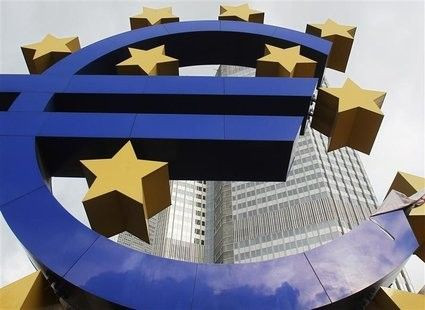Euro Zone To Fall Into Recession In 2Q, But Will ECB Ride To Rescue?
European Central Bank's policy-setting meeting on Wednesday may disappoint investors.

The euro zone avoided recession with zero growth in the first quarter, but it seems to have run out of luck. Recent data out of the single currency bloc has led economists to conclude with confidence that a recession is imminent and the European Central Bank may not act Wednesday.
Economists polled by Reuters are forecasting the region's gross domestic product will contract by 0.5 percent in 2012.
Unfortunately, the most recent figures suggest the decline is well over 1 percent, said Cary Leahey, senior economist at Decision Economics in New York. It would be a more serious euro zone downturn, which no country would be exempted, including Germany.
Euro zone private sector activity suffered its worst monthly slide in nearly three years in May, the London-based research firm Markit said Tuesday. The final release of the purchasing managers' index (PMI) for the euro area fell to 46.0 points in May, down from 46.7 in April. Any score below 50 indicates economic contraction.
German output fell for the first time since November, France posted a 37-month low of 44.6 points and Italy was firmly mired in a steep downturn. Meanwhile, Spanish services sector showed its 11th consecutive print below 50, falling to 41.8 in May from 42.1 in April.
The PMI figures are suggesting a deeper, if not prolonged, downturn in Europe, Leahey said.
The PMI report came as Spain's Budget Minister Cristobal Montoro warned Tuesday that the government has effectively lost access to capital markets because of the steep risk premiums demanded by sovereign bond investors.
The risk premium refers to the extra interest rate that investors demand to hold Spanish debt, compared with German debt, which is considered the safest in the euro zone. Spain's 10-year bonds yield is currently hovering near the 7 percent mark, compared with Germany's 1.2 percent.
There's seems to be a magic number in the thinking of investors that 6.5 percent longer-term borrowing cost for a sovereign nation in the euro zone is unsustainable and Spain has hit that point a couple of times, Leahey said, adding that international investors are rushing to cut their exposures to the sovereign debt of peripheral governments.
Spain didn't really have a sovereign debt problem; its sovereign debt-to-GDP ratios is no worse than Germany's. However, Spain's trouble arose from the imbalanced economic expansion in the past 10 years, a steep downturn with unemployment rates above 20 percent, and layered upon that, are austerity measures and high borrowing costs.
That's an unsustainable position for any economy, Leahey said. And unfortunately, it's the fourth largest in Europe.
Investors are now anxiously waiting for Wednesday's monthly meeting of the European Central Bank to see if it would step up as lender of last resort and cut, or at least signal a cut soon, in the main bank rate.
There is a toxic inter-relationship between bank and sovereign credit risk, Leahey said, so if there's a problem in sovereign debt, there's eventually a problem in the banks, and vice versa.
What the market wants, they are not going to get [this Wednesday], Leahey said. But what they will get is a promise to cut rates down the road, and probably some longer-term lending to the Spanish government.
© Copyright IBTimes 2024. All rights reserved.






















